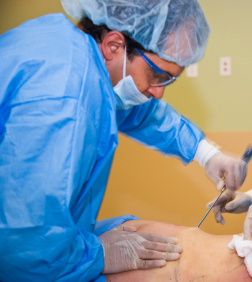It’s logical to think that ‘The better the surgeon, the better the result.’ But how do we define ‘better’? There is a term us surgeons use when a surgeon performs a technical skill with unusual precision and dexterity…we call them ‘slick’. I remember when I was training, and I was exposed to the skills of a variety of surgeons in the operating room, there were some surgeons who stood out…and these were the surgeons I wanted to learn from.
Surgery is different from most medical specialties in that it not only involves a knowledge-base, it also involves a technical skill…and for some surgeons their skills are at such a high level I’d say they had a talent. Skills are learned…talent you’re born with. It’s the smart people who recognize their talent and somehow work it into their careers.
A recent article in the October 10, 2013 issue of the New England Journal of Medicine tried to somehow measure how ‘slick’ a surgeon was. The authors used Bariatric Surgeons as an example, but the concept applies to any surgical specialty. The authors assembled a panel of ‘judges’- surgeons in the same specialty who were familiar with the surgeries being performed. These judges anonymously viewed videos of different surgeons performing the same operation and were asked to score the skill-level of the surgeon performing the procedure on a 1-5 scale. Each video was shown to at least 10 different judges. Complication rates, length of surgery, re-operation rates, and hospital re-admission rates were all compared as it related to skill-score. As expected, superior surgical skill was related to lower rates of complications, shorter surgery, and reduced re-operation and readmission rates. Perhaps the only thing that may have limited the accuracy of the study was that it was up to the surgeons themselves to select a video that they felt was representative of their own skills.
So how does this all help us? It’s another reminder that skill is important and that all surgeons are not equal. There’s no way for a patient to measure how ‘slick’ a particular surgeon is, but it is clear that the better skilled the surgeon the better the surgical result and the lower the risk of complications. These issues affect the results of cosmetic breast surgery in ways that are very different than other surgical procedures. Satisfaction of a patient after Breast Augmentation surgery depends on factors that are short-term and others that are long-term. Of course the skill of your surgeon affects your short term result and appearance…but the long term result, especially the risk of implant issues and the formation of capsule contractures, are dependent on a number of skill-related factors including how your implants are handled, the length of surgery (which affects swelling), and the amount of bleeding during surgery. All of these factors have been shown to affect capsule contracture and implant rupture rates- which are the greatest long term concerns with breast implant patients.
Unfortunately there’s no way to measure the skill of your surgeon before surgery, Botox or filler (Restylane) treatments. You can get a sense of someone’s skill by who his patients are and how happy they seem to be. Ask how many similar patients the doctor has treated as skills get better when the same procedure is performed over and over. Look online and look for photos. A good experienced surgeon will have lots of them. Ask questions. Ask a surgeon how many other doctors he/she has treated. Speak to other patients in the waiting room. Don’t be afraid to speak to a Plastic Surgeon on the phone before your initial visit. If he won’t answer some initial questions on the phone then go somewhere else! Be smart and be sure your doctor is credentialed properly. In my experience in Plastic Surgery the surgeons who are technically slick are also the ones who give patients their time.
